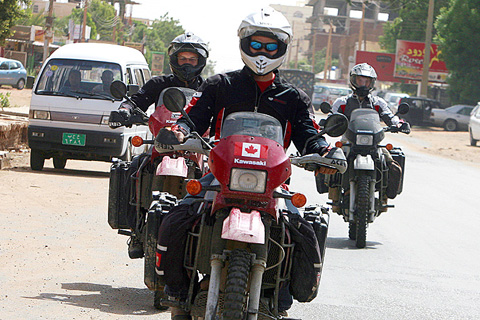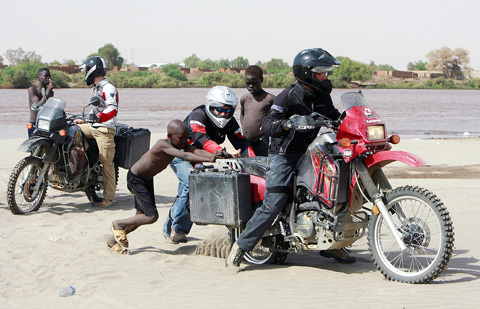After racing through spectacular desert, sleeping under the stars and enjoying boundless hospitality, three Westerners on a motorbike odyssey say they are convinced that Sudan is Africa’s next tourist paradise just waiting to be discovered.
President Omar al-Beshir may be the first sitting head of state in history to face a possible international arrest warrant for alleged genocide and war crimes, but two Canadians and an Englishman are spellbound by the country.
“I’m convinced that in a few years’ time Sudan will be right up there with the other big African countries in terms of tourist spots,” said Tom Smith, on three months’ leave from the Bank of England to bike from London to Cape Town.

PHOTO: AFP
“If it stays like this, you know, has the same appeal, then yeah — I think they’ll be flocking,” added the 25-year-old, on a pit stop in Khartoum with the desert behind them and a two-day run to the Ethiopian border ahead.
More than two years in the planning, their 24,000km ride through Europe, the Middle East, Sudan and down through Africa to the Cape is costing Smith and his Canadian mates a self-financed total of US$60,000.
Inspired by film actor Ewan McGregor and his close friend Charley Boorman who rode BMW bikes from Scotland to South Africa for a television series, the intrepid three are also raising thousands of dollars to help HIV sufferers.

PHOTO: AFP
They were apprehensive about the security situation in Sudan, bogged down in war in Darfur to the west and also trying to recover from a 21-year north-south civil war.
But such fears quickly dissipated after their arrival in Sudan by ferry from Egypt across Lake Nasser.
“The perception of this war-torn country has been the focus of the media, but the experience that we’ve had — nothing could be further from the truth,” said Tyson Brust, a 30-year-old medical student from Toronto.
“It’s probably one of the safer areas in the world, and we found that when we went through. The people were incredibly friendly — everyone was waving us in, wanting us to have breakfast with them and giving us drinks,” he added.
Such comments are music to the ears of a country slapped with US sanctions, blacklisted by Washington as a sponsor of terror and on a diplomatic offensive to save Beshir from the dock of the International Criminal Court.
After driving dirt bikes through Europe, Syria and Jordan and enduring a horrifying crash that left 32-year-old Yarema Bezchlibnyk in pain and weary of “being completely shafted” in Egypt, they say their adventure really began.
Yarema, also a medical student, described the journey from Lake Nasser to Dongola, site of a mediaeval city, as a “spectacular ride, the landscape almost lunar” with rock formations jutting from the desert and blasted by the scorching heat.
“We got into the desert. The sun started to go down and I was thinking ‘wow, I’m in Sudan riding through the desert.’ Just spectacular scenery. This is what it’s all about, this is the adventure,” added Tyson.
They expect to be in Sudan for another week. They have slept under the stars, been invited to stay overnight in village huts and rested at a guest house recommended by a friend of a friend near the UN headquarters in Khartoum.
But it has not all been plain sailing. Stomach upsets from the local cuisine have plagued their advance since Turkey. None is a trained mechanic, so just a flat tire can take half a day to repair. And the heat can be intense.
They are a week behind schedule and need to get to Cape Town in time to fly back for medical school and work. They’ve been away for a month and a half, but at 10,100km have completed only two-fifths of the route.
Smith likened one hotel they stayed in — apparently the best in town — to a POW camp with cell-like rooms where they awoke “absolutely sweltering” because the air conditioning had conked out in a power cut.
Despite having just one guidebook, they are finding their way without GPS and stumbling across tourist gems quite by chance — such as lazing under palm trees next to an ancient Egyptian temple after lunch.
Sudan’s attraction was being able to realize the dream of getting off the beaten track — the trio’s blog is at www.ditchthecomfortzone.com. But from Wadi Halfa to Dongola they also witnessed Sudan’s march to development on the back of oil profits.
“You can see that in a couple of years that (new road) is going to be finished. You won’t need any of the dirt bikes that we’ve kitted out — you can do it on anything,” said Smith.

On April 26, The Lancet published a letter from two doctors at Taichung-based China Medical University Hospital (CMUH) warning that “Taiwan’s Health Care System is on the Brink of Collapse.” The authors said that “Years of policy inaction and mismanagement of resources have led to the National Health Insurance system operating under unsustainable conditions.” The pushback was immediate. Errors in the paper were quickly identified and publicized, to discredit the authors (the hospital apologized). CNA reported that CMUH said the letter described Taiwan in 2021 as having 62 nurses per 10,000 people, when the correct number was 78 nurses per 10,000

As we live longer, our risk of cognitive impairment is increasing. How can we delay the onset of symptoms? Do we have to give up every indulgence or can small changes make a difference? We asked neurologists for tips on how to keep our brains healthy for life. TAKE CARE OF YOUR HEALTH “All of the sensible things that apply to bodily health apply to brain health,” says Suzanne O’Sullivan, a consultant in neurology at the National Hospital for Neurology and Neurosurgery in London, and the author of The Age of Diagnosis. “When you’re 20, you can get away with absolute

May 5 to May 11 What started out as friction between Taiwanese students at Taichung First High School and a Japanese head cook escalated dramatically over the first two weeks of May 1927. It began on April 30 when the cook’s wife knew that lotus starch used in that night’s dinner had rat feces in it, but failed to inform staff until the meal was already prepared. The students believed that her silence was intentional, and filed a complaint. The school’s Japanese administrators sided with the cook’s family, dismissing the students as troublemakers and clamping down on their freedoms — with

As Donald Trump’s executive order in March led to the shuttering of Voice of America (VOA) — the global broadcaster whose roots date back to the fight against Nazi propaganda — he quickly attracted support from figures not used to aligning themselves with any US administration. Trump had ordered the US Agency for Global Media, the federal agency that funds VOA and other groups promoting independent journalism overseas, to be “eliminated to the maximum extent consistent with applicable law.” The decision suddenly halted programming in 49 languages to more than 425 million people. In Moscow, Margarita Simonyan, the hardline editor-in-chief of the